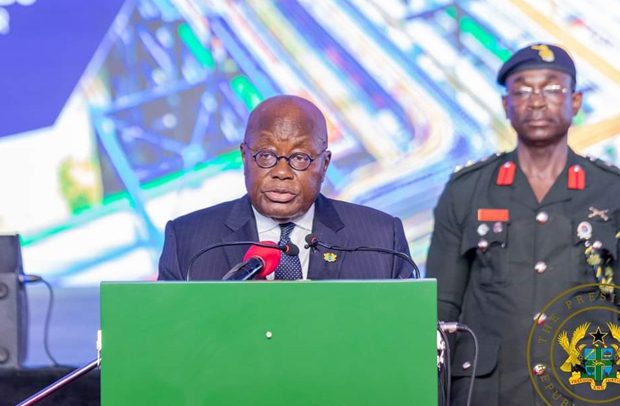President Nana Addo Dankwa Akufo-Addo has emphasized the importance of African leaders thinking about West Africa and Africa as a whole before individual countries.
He explained that by doing so, each country could become better and more prosperous.
Speaking at the inauguration of the Dangote Oil Refinery in Lagos, Nigeria, the President congratulated Aliko Dangote, a distinguished African entrepreneur, for his impressive initiative in constructing the Dangote Refinery and Petrochemical Complex.
President Akufo-Addo emphasized the crucial role entrepreneurs play in growing successful economies, saying that the refinery would not only strengthen the Nigerian economy, but that of West Africa and the entire continent by extension.
He encouraged the advancement of a culture of entrepreneurship in West Africa, stating that Dangote is a prime example of a successful and iconic African business leader.
The President likened Dangote’s level of entrepreneurship to celebrated figures such as Musk, Gates, Page, Bezos, and Zuckerberg, highlighting the Nigerian entrepreneur’s exceptional achievements and contributions to the region and the continent.
The Dangote Refinery and Petrochemical Complex promises to strengthen West Africa’s economy, make the region more prosperous, and help drive growth on the continent.
By focusing on elevating the entire region, individual countries can reap the benefits and achieve even greater economic success.
“I have said it before that when we think of West Africa and Africa before our individual countries, we are not just being pan-Africanists, we are being true nationalists, because what makes West Africa, and, indeed Africa, better, will make each of our individual countries better and more prosperous.
“This spectacular project, the Dangote Refinery and Petrochemical Complex, does exactly that – makes West Africa better and stronger – and I congratulate this distinguished, patriotic son of Africa for the sheer brilliance of this initiative.
“The truth is that successful economies depend largely on entrepreneurs running successful businesses. We need to push vigorously, in West Africa, the culture of entrepreneurship, so that we can grow our economies, and become prosperous. There is no greater symbol of entrepreneurship in the 21st century in West Africa, and, indeed, in Africa, than this iconic Nigerian entrepreneur, easily the equal of the celebrated entrepreneurs of our generation, such as Musk, Gates, Page, Bezos and Zuckerberg,” President Akufo-Addo said.
For his part, the President of Nigeria, Muhammadu Buhari, who inaugurated the refinery, which is currently the world’s largest single-train petroleum refiner, said his regime had been deliberate about ensuring public-private partnerships.
He described the refinery as a milestone for the Nigerian economy and a game-changer for the downstream petroleum market in the African continent.
Buhari said, “I recall that just about a year ago, I was here to commission your fertiliser (plant) and had the opportunity to briefly inspect this refinery complex which was under construction. The Group Chairman, Aliko Dangote, assured me that the refinery will be ready for commissioning before the end of my tenure.
“I’m aware that this is not the first time that the Dangote Group under Alhaji Aliko Dangote’s leadership is putting Nigeria on the global map through his bold investments in key industries. This has helped to transform our economy from heavy import dependence to a net exporter in some critical industries including cement and fertiliser.”
At the inauguration, which had in attendance senior government officials from Nigeria and other African countries, Buhari described the refinery as a game-changer, just as the Founder/Chairman, Dangote Group, Aliko Dangote, declared that the facility would put an end to the inflow of toxic substandard petroleum products into Nigeria.
According to the president, Nigeria’s economy, which has been stressed for many years and over a decade of insurgency, has also been severely impacted by several external crises including the global financial crisis, the collapse of oil prices, the Coronavirus pandemic, and the Russia-Ukraine war.
The consequences of these challenges, he said, constituted a severe strain on the economy, limiting government’s ability to provide basic infrastructure without resorting to huge borrowing.
He said, “Our government, therefore, focused its attention on creating an enabling environment for the private sector to thrive and fill the enormous gap in investments, not only in infrastructure, but also in all critical sectors.”
Also speaking at the event, the founder of the refinery, Dangote stated that the refinery would start delivering refined products to the Nigerian market from July this year, as operators urged the Federal Government to ensure transparency in the supply of crude oil to the 650,000 barrels per day crude oil processing refinery.
He said, “It is our firm commitment that we will replicate in this sector what we have actually achieved in the cement and fertiliser markets, while Nigeria transformed from being the largest importer of these crude products to a net exporter.”
He pointed out that the “first goal is to ramp up projections of various production to ensure that within this year, we are able to fully satisfy our nation’s demand for higher quality products to enable us to eliminate the tragedy of import dependency and stop, once and for all, the dumping in our market of toxic substandard petroleum products.
“Our first products will be in the market before the end of July, beginning of August this year.”
He also said the refinery plans to export to 53 African countries which depend on other countries for petroleum products.
Meanwhile, the Central Bank of Nigeria Governor, Emefiele said the Dangote Refinery and Petrochemicals could spare Nigeria about N5tn to N7tn annually in the fiscal expenditures of the federal government over the next five years.
He noted that the project would support the fiscal operations of the government, easing budget constraints of funding fuel subsidy.
The CBN governor added that the cost of fuel subsidy may hit N4.4tn by the end of 2022.
He said, “This project will equally provide support to the fiscal operations of the government as it could help ease budget constraints of funding the petroleum subsidy and engender fiscal savings. Available data indicate that, over a five-year period, fuel subsidy in Nigeria rose more than nine-folds from about N154bn in 2017 to over N1.43tn before another three-fold rise to N4.4tn by the end of 2022.
“A simple straight-line projection suggests that this figure could surpass N7tn within the next three years if we do not tackle it effectively. Thankfully, the Dangote Refinery and Petrochemicals could spare Nigeria about N5tn to N7tn annually in fiscal expenditure of the federal government over the next five years.”
Emefiele also expressed optimism that Nigeria, under the incoming administration, would cease importing petroleum products, fertiliser and petrochemicals and save the country over $26bn.
He said, “Nigeria will cease importing petroleum products, fertiliser and petrochemical that drained over $26bn in 2022. The self-sufficiency in refined petroleum, urea, and polypropylene, which Nigeria has attained with this project is a strong testament to how leadership, dedication, focus, commitment, and resilience have helped Nigeria on its drive towards import substitution and export orientation.”
The CBN governor also noted that the take-off of the Dangote Refinery and Petrochemical factories came with some economic benefits to Nigeria, such as generating thousands of direct jobs and millions of indirect jobs, with over 135,000 permanent jobs.
He added that nearly 4,000 Nigerian personnel are on site, excluding employment by the various contractors and subcontractors at the project site.
The apex bank boss also said that the project would generate up to 12,000WM of electricity, saying, “I am also proud to state that the project will generate up to 12,000MW of electricity. In addition, the refinery and the other ancillary projects will have significant multiplier effects on other sectors of the economy by supporting a diverse range of sectoral value-chains.”
Emefiele further said that the project could save the country in terms of foreign exchange and fiscal burden.
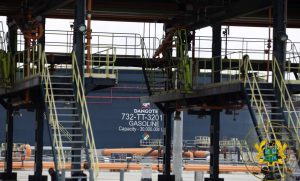
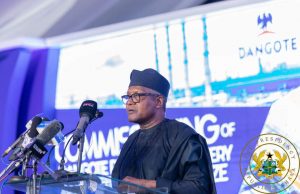
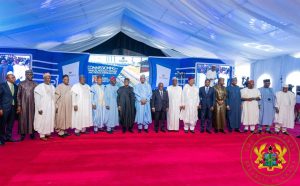
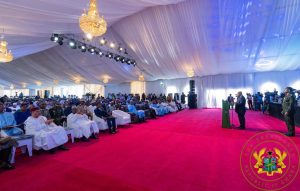
By Vincent Kubi


